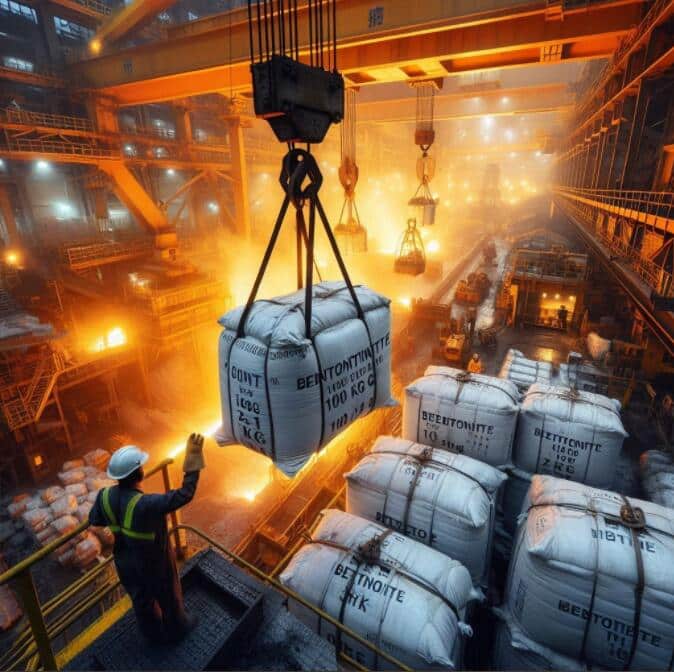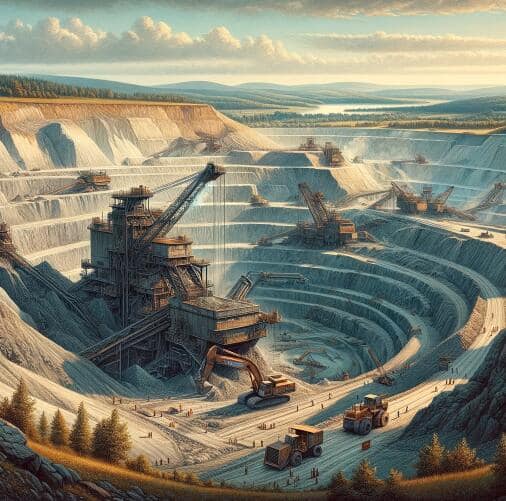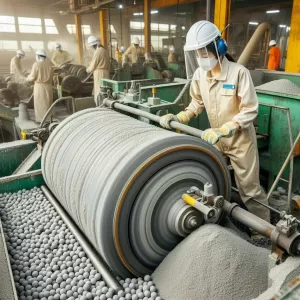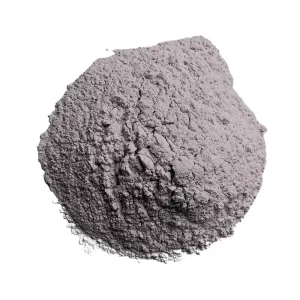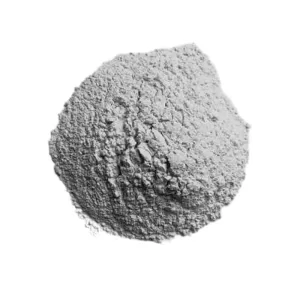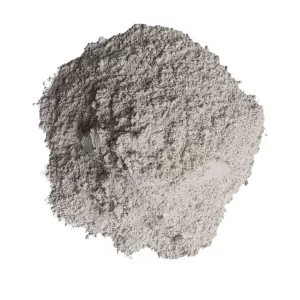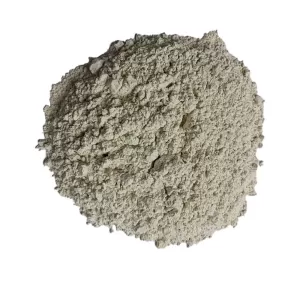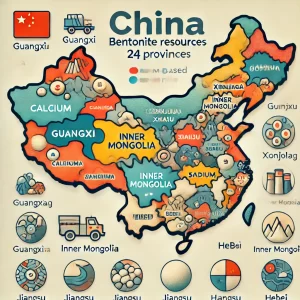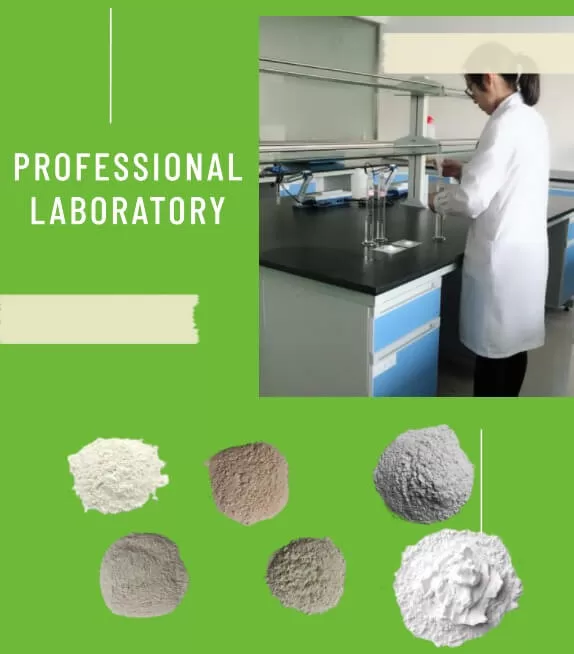Bentonite is a silicate with a layered structure, primarily composed of montmorillonita, which has easily exchangeable interlayer cations and a large ion exchange capacity.
The term “bentonite” originates from the place name of clay-producing areas in Wyoming, USA, and is also known as “montmorillonite” or “swelling rock.” Pure bentonite is relatively rare; most contain varying amounts of impurities such as quartz, feldspar, mica, zeolite, and pyrite.
Bentonite is usually white but can also be light gray, cream, light red, flesh-colored, brick red, brownish red, yellowish green, black, mottled, and has a greasy, waxy, or earthy luster, and flaky or serrated fracture.
Due to its excellent physicochemical properties, bentonite has been used in more than 100 departments across 24 fields of industrial and agricultural production abroad, with over 300 products, earning it the title of “versatile soil.“
It can be used as an adhesive, suspending agent, thixotropic agent, stabilizer, purification and decolorization agent, filler, feed, catalyst, etc., and is widely used in metallurgy, petroleum, casting, food, chemical industry, environmental protection, and other industrial sectors.
What are the main uses of bentonite in China, and what types of bentonite are used in each field?
The following table provides a detailed introduction, which we hope will be helpful to industry friends:
| Application Field | Main Use | Type of Bentonite Used |
|---|---|---|
| Casting | Binder for foundry sand | Sodium-based or calcium/magnesium-based bentonite |
| Adhesive for hydrated foundry sand, surface stabilizer | Organic bentonite | |
| Metallurgy | Binder for iron concentrate pellets | Sodium-based bentonite |
| Drilling Mud | Preparation of drilling mud suspensions with high rheological and thixotropic properties; rig release agent | Sodium, calcium, magnesium-based bentonite; organic bentonite |
| Food | Decolorization and purification of animal and vegetable oils; clarification of wine and juice, stabilization, saccharification, and purification of sugar juice in beer production | Bleaching earth (acid-activated); sodium-based bentonite (activated or natural); other bentonites |
| Petroleum | Refining, decolorization, and purification of petroleum, fats, paraffin, and kerosene; preparation of tar-water emulsions | Bleaching earth; calcium/magnesium-based bentonite |
| Stabilizer for asphalt surfaces; thickener for lubricating oils (greases) | Organic bentonite | |
| Agricultura | Soil conditioner; additive for mixed fertilizers; additive and adhesive in animal feed (to improve feed utilization, meat, and egg production rates); bedding soil for animal pens (odor and disinfection) | Various bentonites |
| Industria química | Carrier for catalysts, insecticides, pesticides, and fungicides; filler for rubber and plastics; additive for daily chemical products such as desiccants, filters, detergents, and soap; thixotropic and thickening agent in pigments, raw paints, synthetic resins, and series of pigments such as iron, lead, zinc, etc. | Bleaching earth; sodium-based bentonite (activated or natural); lithium, magnesium-based bentonite |
| Anti-ink sedimentation aid | Organic bentonite | |
| Water Purification and Wastewater Treatment | Treatment of industrial wastewater (liquid); purification of swimming pool water; treatment of waste from the food industry; adsorbent for radioactive waste | Bleaching earth; sodium-based bentonite (activated or natural) |
| Civil and Construction | Suspension for slurry pits, soil stabilizer, lubricant for tamping, plasticizer and additive for concrete; material for preventing leakage in water tanks | Various bentonites |
| Papermaking | Staining agent and pigment filler for carbon paper | Bleaching earth; calcium/magnesium-based bentonite |
| Textile Printing and Dyeing | Filling, bleaching, anti-static coating, replacement of starch sizing, and printing paste | Bleaching earth; sodium-based bentonite (activated or natural) |
| Ceramic Industry | Plasticizer for ceramic raw materials (to improve the compressive strength of ceramic bodies); fabricación de bentonita of glaze and enamel | Various bentonites |
| Medicine and Cosmetics | Adsorbent for drugs and binder for ointments, pills, and cosmetic bases | Magnesium, calcium, lithium, bentonita a base de sodio |
| Mechanical Industry | High-temperature lubricant | Organic bentonite |
The five main advantages of bentonite in paint applications:
Thickening Effect: Bentonite forms flocculent substances in water, which have a thickening effect. Its molecular groups can bind with the organic materials in paint, enhancing the water resistance of the coating and improving its strength and adhesion.
Suspension and Dispersion: Bentonite has good suspension and dispersion in water media, preventing the paint from settling or stratifying, ensuring even color, and improving the stability of the paint suspension. It also provides good brushing performance, allowing for the creation of uniformly thick, smooth coatings.
Adhesion and Coverage: Bentonite has certain adhesive and covering properties and is cost-effective. When added to polyvinyl alcohol series glue, it can significantly reduce the amount of polyvinyl alcohol and its fillers (such as light calcium carbonate), lowering the product cost.
Hydrophilicity, Plasticity, Expansion, and Adhesion: Bentonite has excellent hydrophilicity, plasticity, expansion, and adhesion. It can form a colloid when combined with an appropriate amount of water, releasing charged ions in water. The electrostatic repulsion between these ions acts as a dispersant in paint.
Cold Resistance: Bentonite has cold resistance, allowing the prepared paint to be used at lower temperatures in winter.



